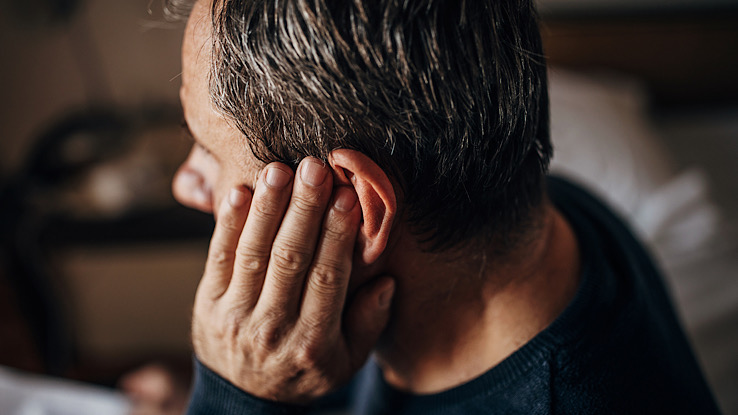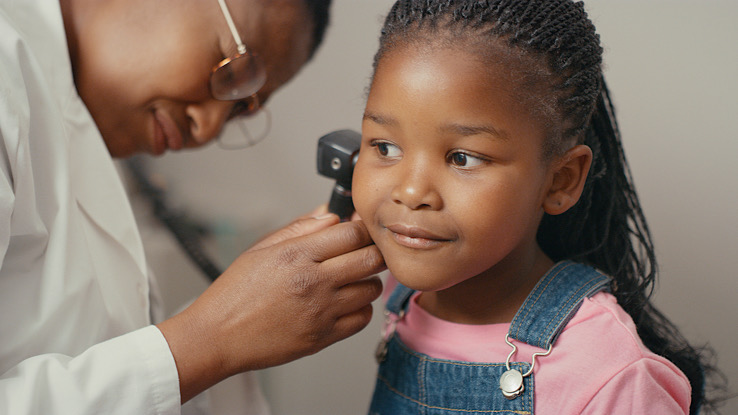
If you or your child has ear pain or fluid coming out of the ear, it might mean one of you has an earache. Earaches are a common condition caused by ear infections, and kids are more likely to get them than adults. Earaches often go away on their own, so usually, all you need to do is manage the pain and monitor the condition’s progress. If an earache does not improve on its own, allergy medications and antibiotics may be needed to clear the ear of infection. Continue reading for more details on how to tell if you have an earache.
What Is an Earache?
An earache is ear pain caused by a bacterial or viral infection of the middle ear. The middle ear is the part of the ear behind the eardrum that amplifies sounds. The fluid that builds up in the ear is normally drained by the Eustachian tube, a narrow tube that extends from the middle ear to the throat. Having a cold, the flu, or allergies can cause the Eustachian tube to become congested and swollen, leading to fluid buildup in the middle ear. This fluid can become infected and cause earaches.
Your child is more likely to get earaches than you because Eustachian tubes in children are narrower and more horizontal, making drainage more difficult and clogging more likely. If your child is often in group settings like childcare centers, they are more likely to get infections, such as a cold or the flu, from other children, which also increases their likelihood of getting ear infections.
While earaches are less common in adults, there are a few things that can increase an adult’s risk of getting an earache:
- Having a cold or upper respiratory infection
- Having allergies
- Being a smoker or being exposed to secondhand smoke
Signs and Symptoms of Earache
So how can you tell if you have an earache? There are some signs and symptoms that you may have an earache, which may be different for you and your child.
If your child has an earache, they may experience the following symptoms:
- Pain in the ear, especially when lying down
- Tugging or pulling at the ear
- Difficulty sleeping
- Fussiness
- Crying more than usual
- Difficulty hearing
- Issues with balance
- Fever
- Drainage from the ear
- Headache
- Loss of appetite
As an adult, if you have an earache, you will likely experience:
- Pain in the ear
- Drainage from the ear
- Muffled hearing
- Sore throat
- Fever
- Issues with balance
If you are still not sure how to tell if you have an earache, talk to your doctor. Your doctor will ask you how you’ve been feeling and conduct a physical exam using a tool called an otoscope to check your ears for infection. The otoscope has a light attached to it, and it is used to shine a light in the ears and see if the eardrum looks infected. A similar tool called the pneumatic otoscope blows a little bit of air into the ear to see how well the eardrum moves. If the eardrum doesn’t move well, that may mean there is fluid behind it, suggesting an ear infection.
Prevention
There are many ways that you can prevent earaches, some of which include:
- Preventing the common cold and other illnesses: Teach your kids to wash their hands and cough or sneeze into their elbow. If possible, limit the time they spend in childcare. Keep your child at home when they’re sick.
- Avoiding secondhand smoke: Don’t allow people to smoke in your home, and avoid secondhand smoke when in public.
- Breastfeeding your baby: If possible, breastfeed your baby for at least six months. Breast milk has proteins called antibodies that may protect a baby from infections, including ear infections.
- Bottle-feeding: If you’re bottle-feeding your baby, hold them upright while feeding. Babies who drink from a bottle, especially when lying down, are more likely to get earaches than babies who breastfeed.
- Talking to your doctor about vaccinations: Ask your doctor what vaccinations are most important in preventing ear infections.
When To See a Doctor

Ear infections often go away by themselves. However, you should take your child to a doctor if they have an earache and any of the issues below:
- Symptoms that last more than a day
- Symptoms in a child that is younger than six months old
- Severe ear pain
- Sleeplessness or fussiness after having a cold
- Fluid, pus, or blood coming out of the ear
If you have any of the issues below, you should also see your doctor as soon as possible:
- High fever
- Severe pain behind the ear
- Paralysis in the face
Middle ear infections that go untreated can cause long-term issues like infection in other parts of the head, permanent hearing loss, and paralysis of a facial nerve. When earaches don’t go away, they may be treated with antibiotics, pain medication, and allergy medication. Aspirin should never be used in kids or teenagers who are recovering from flu-like symptoms because aspirin use after viral infections in young people has been linked to a life-threatening condition called Reye’s syndrome.
What If the Earaches Keep Coming Back?
If your child has many earaches, they may get ear tubes placed in their ears by an ear, nose, and throat (ENT) surgeon. Ear tubes are placed in the eardrums to prevent fluid from building up in the middle ear. An ENT surgeon might place ear tubes in your child’s ears if they have:
- Frequent middle ear infections
- Fluid in the middle ears for three months or more
- Fluid in the middle ears that leads to hearing loss or speech issues
- Persistent ear infections that don’t improve with antibiotics
The surgery for an ear tube placement is quick, and your child can go home right after the procedure is done. Children with ear tubes need a follow-up one month after the tubes are placed and then every six months until the tubes fall out on their own. The tubes usually fall out after nine to twelve months. By that point, kids usually don’t have any more earaches. While these tubes are typically given to children, they can also be used in adults.
If you want to know more about how to tell if you have an earache, talk to your doctor for more information.
Resource Links:
- “Ear infection (middle ear)” via Mayo Clinic
- “Ear Tubes” via Children’s Hospital
- “Middle-Ear Infection in Adults” via Hopkins Medicine
- “Ear infections” via Paediatric Child Health





